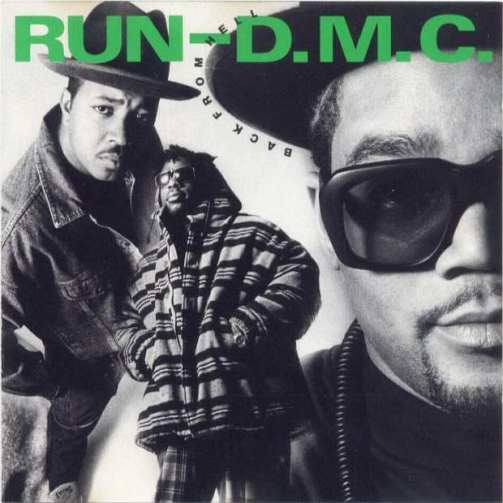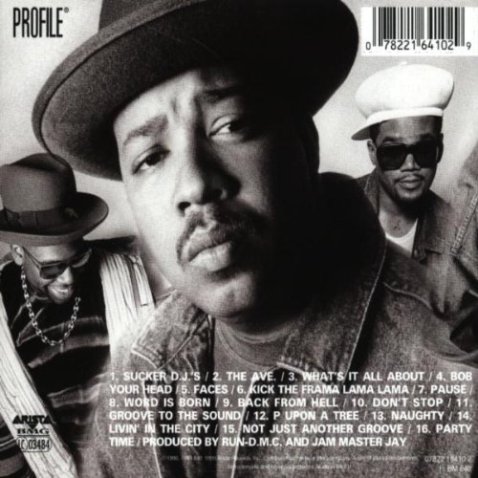
Welcome back to the latest edition of Flashback Friday Flop, a weekly feature in which I examine a hip-hop album from years ago that was considered a flop, either critically or commercially or both, when it was released and see if it has gotten better – or worse – over time.
This week: Run-DMC’s Back from Hell (1990)
A valid argument could be made that Run-DMC is the most important act in hip-hop history. They influenced so much of the culture, from the sound to the look and, in the process, became one of the first prominent rap artists to be featured on mainstream media, most especially MTV. Their 1986 crossover smash “Walk This Way” with Steven Tyler and Joe Perry not only revitalized Aerosmith, but also became a landmark in hip-hop, becoming the first rap song to reach the top five of the Billboard 100 (peaking at number four).
They took hip-hop from local to global. As Styles P once said, “Only Kings of New York was Biggie and Run.”
“Walk This Way” was featured on Raising Hell, the group’s third and most successful album, eventually going triple platinum. Two years later came Tougher Than Leather, which was not as successful following a contract dispute and a disastrous accompanying movie, but still garnered the group a platinum plaque.
By 1990, Run-DMC had released four albums – one triple platinum, two platinum, and one gold – but the sound of hip-hop was rapidly changing and expanding. That year alone saw Public Enemy, Brand Nubian, and X-Clan release powerful, sociopolitical, black awareness albums – Fear of a Black Planet, One for All, and To the East, Blackwards, respectively – Ice Cube drop his stunning debut, AmeriKKKa’s Most Wanted, and the emergence of A Tribe Called Quest on the scene, not to mention Teddy Riley’s New Jack Swing was all over the radio.
At the same time, the expectations of what a top tier MC could do had been raised exponentially in the four years since Raising Hell by artists like Chuck D, Cube, KRS-One, and, of course, Rakim. They packed their verses full of wordplay and meaning, while the call-and-response shouts on which Run and DMC had built their careers suddenly sounded dated. At the same time, Rick Rubin, who had produced Raising Hell and Tougher Than Leather, had lost a power struggle with Lyor Cohen and decided to leave both Def Jam and New York. Internally, things weren’t any better. Run was battling depression, DMC was an alcoholic, and Jam Master Jay was questioning his own ability to keep pace with other producers, all while they were feuding with their label, Profile.
In short, things were looking bleak Run-DMC.
Into this atmosphere came their fifth album, Back from Hell, which would wind up being the worst received and worst selling album of their careers.
Now that it’s been twenty-five years, how does it stack up with the rest of Run-DMC’s discography?

The album is schizophrenic and messy. It is a patched-together work of all sorts of disparate backdrops and themes headlined by two rappers that had lost their passion for music as well as their chemistry.
The group jumps from sound to sound throughout, never finding a groove. Early on, they touch on life in the hood on “The Ave,” a track clearly influenced by Public Enemy and Ice Cube, and “What’s It All About,” the album’s second single. Then, “Bob Your Head” and “P Upon a Tree” are heavily reggae-influenced while “Pause” and “Faces” find Run and DMC attempt to capitalize on the hot sound of New Jack Swing. The sounds are all over the place. There’s no cohesion at all.
DMC was far from his best on Back from Hell, but he still outperforms his partner throughout much of the project. Run, the first King of New York, wanted to prove that he had skills to compete with the Kanes and the Kool G Raps, but spends most songs straining under the attempt, sounding desperate rather than confident.
In trying so hard to make a “proper” Run-DMC album, they lost their way. This was the group that had been the biggest hip-hop act in the world only a few years earlier but were now struggling to find their sound and, as such, were falling back on familiar tropes. They went from updating “Walk This Way” to remixing the song from Ghostbusters and kicked off the album with “Sucker D.J.’s,” an intro over the “Sucker M.C.’s” beat.
Instead of leading or, at the very least, embarking on their own path, they were following artists they had influenced – a dog chasing its tail – while at the same time still trying to proclaim their dominance. This problem is best exemplified by the “Back from Hell” Remix in which Chuck D and Ice Cube, two greats in their primes, dominate the track and leave the legendary hosts sounding like sidekicks that were simply not up to the challenge.
Of course, news of Run-DMC’s demise would be greatly exaggerated. They returned three years later with Down with the King and then one last time in 2001 with Crown Royal, the former of which was much stronger, but both better than Back from Hell, which remains an unfortunate blemish on a legendary résumé.
Previously in Flashback Friday Flop:
Tha Doggfather | Blood in My Eye | The Best of Both Worlds | Can-I-Bus | Beats, Rhymes and Life | Encore | Immobilarity | 14 Shots to the Dome | Forever | Christmas on Death Row | Double Up | The New Danger | A Better Tomorrow
Christopher Pierznik is the author of eight books, all of which can be purchased in paperback and Kindle. His work has appeared on XXL, Cuepoint, Business Insider, The Cauldron, and many more. You can follow him on Facebook or Twitter.
2 replies on “Flashback Friday Flop: “Back from Hell””
DMC crushed that Back From Hell remix, though. Great article!
LikeLike
Thank you!
LikeLike